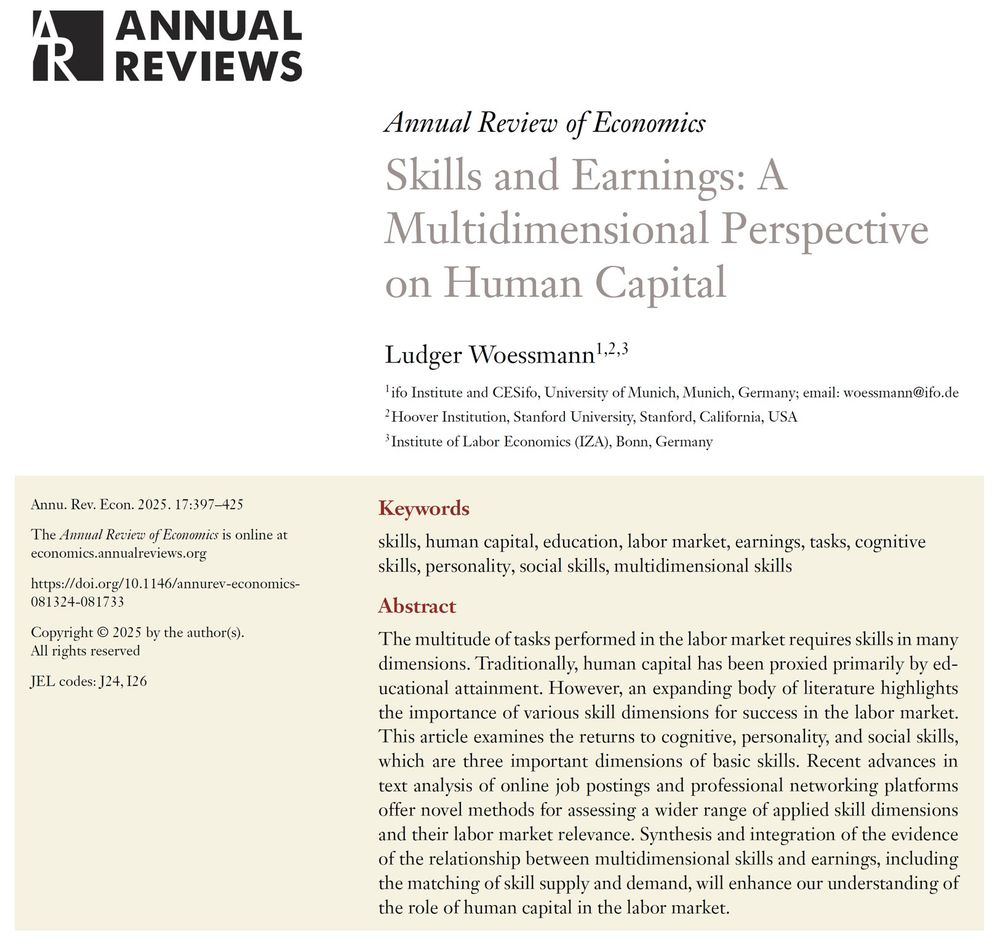
Ziyue Jessie Zhu
@jesszhuzy.bsky.social
680 followers
3.9K following
18 posts
Almost a labor economist
PhD candidate in Economics @ROA, Maastricht
Labor/Education/Behavioral/Experiment Economics; Social Data Science
Views my own
zhuziyue.com
#econtwitter #econsky
Posts
Media
Videos
Starter Packs
Pinned
Reposted by Ziyue Jessie Zhu
Ziyue Jessie Zhu
@jesszhuzy.bsky.social
· Jun 18

Fitting mixed random regret minimization models using maximum simulated likelihood - Ziyue Zhu, Álvaro A. Gutiérrez-Vargas, Martina Vandebroek, 2024
In this article, we describe the mixrandregret command, which extends the randregret command introduced in Gutiérrez-Vargas, Meulders, and Vandebroek (2021, Sta...
journals.sagepub.com
Reposted by Ziyue Jessie Zhu
Reposted by Ziyue Jessie Zhu
Reposted by Ziyue Jessie Zhu
Ziyue Jessie Zhu
@jesszhuzy.bsky.social
· Jun 18
Ziyue Jessie Zhu
@jesszhuzy.bsky.social
· Jun 18

Triglyceride-glucose index (TyG index) is associated with a higher risk of colorectal adenoma and multiple adenomas in asymptomatic subjects
Hypothesis The objective of this study is to evaluate the predictive ability of the TyG index for the presence of adenoma and multiple adenomas in an asymptomatic population. Design A secondary analysis was conducted on a prospective cohort of asymptomatic subjects aged between 50 and 75 who underwent CRC screening. Fasting blood glucose (FBG) and lipid profiles were measured within three months prior colonoscopy. TyG index was estimated as ln [fasting triglycerides (mg/dL) × FBG (mg/dL)/2]. Multivariate logistic regression was performed to assess the association between the TyG index and the risk of adenoma. Its association with multiple adenomas (≥5) and the continuous number of adenomas were assessed by multinomial regression and log-normal linear regression, respectively. Results A total of 1,538 subjects were recruited among which 876 subjects (57%) had at least one adenoma detected. Elevated TyG index was positively associated with the incidence of adenoma (adjusted odds ratio [aOR]: 1.26, 95% confidence interval [CI]: 1.04–1.54). Compared with the lowest TyG index (≤ 8) group, the risk of adenoma was the highest among subjects in the highest TyG index (> 10) group (aOR: 3.36, 95% CI: 1.44–7.73). As compared to the non-adenoma group, the TyG index was also positively associated with multiple adenomas (aOR: 1.74, 95% CI: 1.17–2.57), and the estimate was also the highest in the highest TyG group (aOR: 14.49, 95% CI: 3.12–67.20). As for the number of adenomas, the positive association was maintained (Estimates: 1.06, 95% CI: 1.01–1.12) while the number of adenomas increase the most in the highest TyG index group (Estimates: 1.35, 95% CI: 1.10–1.65). Conclusions Elevated TyG index is associated with an increased risk of colorectal adenoma and an increased number of adenomas for asymptomatic subjects aged ≥50. Trial registration This study was registered on clinicaltrials.gov (NCT03597204 and NCT04034953).
journals.plos.org
Ziyue Jessie Zhu
@jesszhuzy.bsky.social
· Jun 18
Ziyue Jessie Zhu
@jesszhuzy.bsky.social
· Jun 18
Ziyue Jessie Zhu
@jesszhuzy.bsky.social
· Jun 18
Ziyue Jessie Zhu
@jesszhuzy.bsky.social
· Jun 18
Ziyue Jessie Zhu
@jesszhuzy.bsky.social
· Jun 18
Ziyue Jessie Zhu
@jesszhuzy.bsky.social
· Jun 18
Team-Based Approach to Reduce Malignancies in People with Diabetes and Obesity - Current Diabetes Reports
Purpose of Review Numerous observations have indicated an increased risk of developing various types of cancers, as well as cancer-related mortality, among patients with diabetes and obesity. The purpose of this review is to outline multiple-cancer screening among these patients through a team-based approach and to present the findings of a pioneering integrated care program designed for patients with obesity with a specific emphasis on cancer prevention. Recent Findings A community-based multi-cancer prevention program, which provides all services in one location and utilizes team-based approaches, is reported to be feasible and has the potential to enhance the uptake rate of multiple cancers screening among patients with diabetes and obesity. Summary The team-based approach is a commonly utilized method for managing patients with diabetes, obesity, and cancer, and has been shown to be efficacious. Nevertheless, research on team-based cancer screening programs for patients with diabetes and obesity remains limited. Providing a comprehensive screening for colorectal, prostate, and breast cancer, as well as metabolic syndrome, during a single clinic visit has been proven effective and well-received by participants.
link.springer.com
















